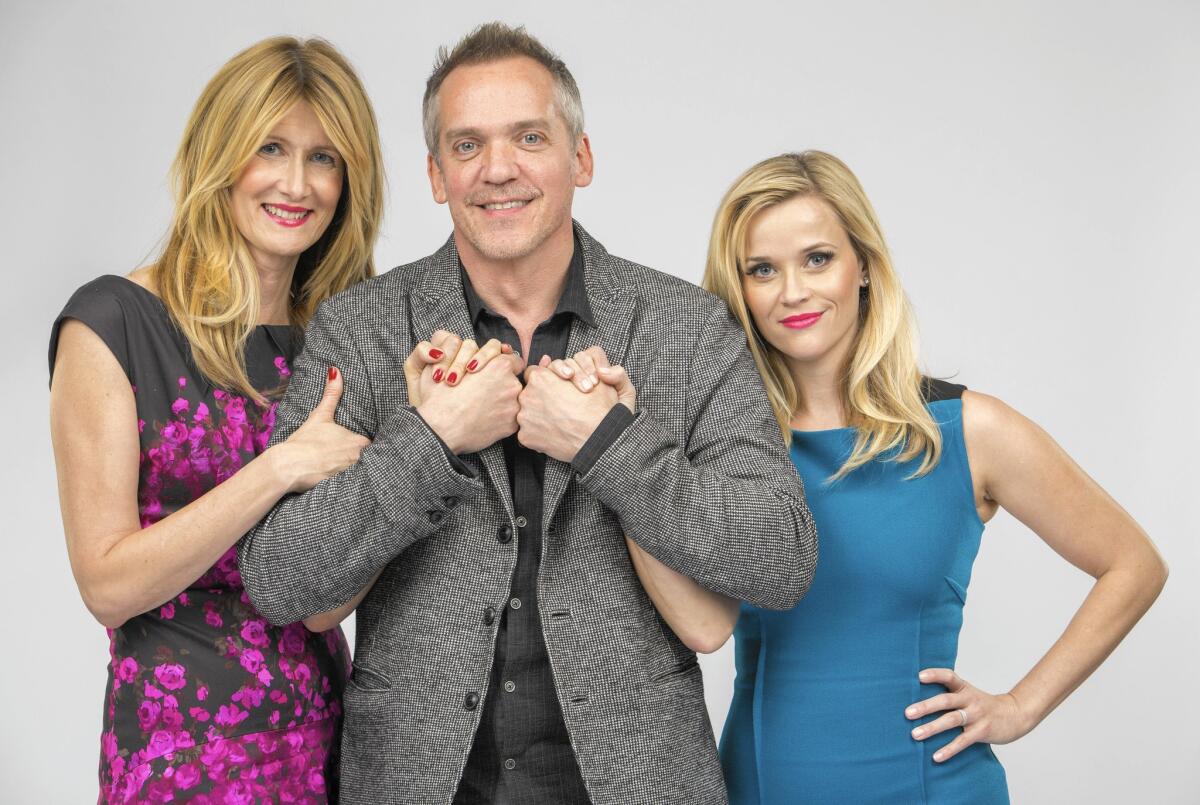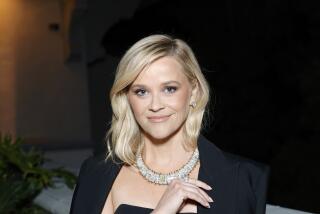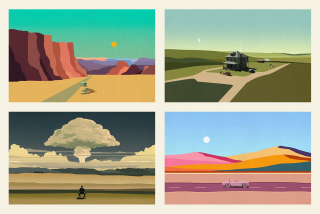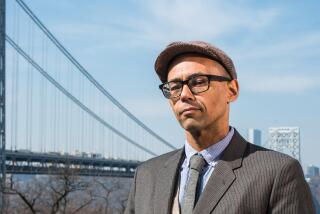Director Jean-Marc Vallee is on a ‘Wild’ ride in Hollywood

Reporting from TELLURIDE, Colo. — While filming “Wild,” director Jean-Marc Vallée set some de-glamorizing ground rules for his lead actress, Reese Witherspoon: She couldn’t wear makeup, had to cover the mirrors in her trailer and wasn’t allowed to lighten the load in the comically massive backpack worn by her character, Cheryl Strayed.
“The film is called ‘Wild,’ not ‘Nice’ or ‘Sweet,’” Vallée said, explaining his stripped-down approach, a performer-friendly style of filmmaking that relies on natural light, handheld cameras and lean crews.
At age 51, with eight finished features, Vallée has worked steadily as a filmmaker for more than 20 years in Canada and the U.S. But he’s enjoying increased recognition in Hollywood recently as a director who shepherds actors through some of their strongest and most taxing performances, dexterously capturing cinema’s trickiest special effect, human emotion.
“Dallas Buyers Club,” Vallée’s raw 2013 drama set during the AIDS crisis of the 1980s, won Oscars for Matthew McConaughey and Jared Leto, both of whom transformed and exposed themselves and showed audiences new range beyond their heartthrob personae.
“Wild,” which opens Wednesday in select theaters, stretches Witherspoon well beyond the chipper roles for which she’s best known, including her Oscar-winning turn as sweet but steely June Carter in the 2005 Johnny Cash biopic “Walk the Line.”
An adaptation of Strayed’s bestselling 2012 memoir of her 1,100-mile solo hike on the Pacific Crest Trail, “Wild” tracks its protagonist’s inner journey as she recovers from the death of her mother, Bobbi (Laura Dern), a painful divorce from her husband (Thomas Sadoski) and reckless experiences with sex and drugs. Vallée shot the film for about $15 million as a modern, female-driven western, with Witherspoon’s tiny frame set against the wide vistas of California and Oregon, nature as her antagonist and Bobbi, appearing ethereally in flashback, as her greatest love.
“I knew this was going to be a really hard movie, and I just didn’t know if I was going to be able to do it, physically and emotionally,” Witherspoon said at the Telluride Film Festival in August, where she, Vallée and Dern shared a table the morning after “Wild’s” first public screening. “I also knew Jean-Marc wouldn’t turn the camera away.”
Strayed’s agent had sent “Wild” to Witherspoon’s agent before it was published, and within days of reading the galley, Witherspoon bought “Wild” with her own money, enticed by the rare opportunity it presented her to evolve on screen.
She and her producing partner, Bruna Papandrea, saw Vallée’s 2005 French-language film “C.R.A.Z.Y.,” about a sexually confused teenager in 1970s Montreal and “The Young Victoria,” his 2009 drama starring Emily Blunt as the British monarch, as well as footage from “Dallas Buyers Club,” which wasn’t finished. They were drawn to the urgency and fluidity of his direction, Papandrea said.
The producer said she had to woo Vallée into reading the “Wild” script; he has a tendency to burrow deeply into whatever project he’s working on, and when Papandrea called, he was preparing to make a romantic drama.
‘Gen.’ Vallée
With salt-and-pepper hair around his temples and a soft, Quebecois-accented voice, Vallée can seem deceptively low-key. But at work he’s intense, even he admits, holding firm to his opinions even when producers and studio backers raise objections. He has two grown children; for fun he likes to DJ at clubs in Montreal, where he lives.
“I’m Dr. Jekyl and Mr. Hyde,” Vallée said. “Adrenaline makes me change. I’ve got emotional material, so I try to give everything to it. I guess I become a little bit of a general. I become a little bit pushy and directive.”
“There’s a surety with Jean-Marc, which all good directors need to have,” Papandrea said. “I love when directors spar with me, because it means they know what they want.”
When he did finally read the “Wild” script, the idea of a maternal love story hit Vallée with particular force; he was mourning his own mother, who had died of cancer in 2010. “My mom was like Bobbi, so positive,” he said. “The book was so emotional. Who says, ‘My mother was the love of my life’? Who says that? The love of your life is a soul mate.”
Strayed’s memoir made for a tricky adaptation, as she interwove her experiences on the trail with recollections of the life that got her there. Vallée accentuated the mother story line by adding scenes for Dern along the trail, where she appears, like a mirage, popping out from behind trees. In one improvised sequence, Bobbi jumps into a puddle with young Cheryl, who was played by Strayed’s real-life 9-year-old daughter, Bobbi.
To get to the location of the film’s opening scene in the shadow of Oregon’s Mt. Hood, where Witherspoon hurls a boot into a precipice in a fit of frustration, the crew had to take two ski lifts and hike a half-hour with gear and a live fox. Camera operators hung off the side of a mountain with belay ropes.
“Filmmaking is so heavy, there are so many people and trucks and teamsters and costume people and hair people and makeup people,” Vallée said. “I try to make it light and as simple as possible. It’s great for actors. It puts the story up front. It’s not about shots and dollies and lighting and sets.”
Some scenes required a fine touch emotionally, as in the sequences where Witherspoon portrays Strayed’s lonely, desperate sexual encounters. The actress said she had been so nervous about them she’d sought help from a hypnotist to prepare.
“We got to set and Jean-Marc said, ‘Let’s talk about the sexuality. I think we need to push it a little bit more’ and I was like ... ‘Don’t make me do it!,’” Witherspoon said. “Can’t we make Laura do it?”
Vallée’s staging and editing of those scenes and his focus on Strayed’s perspective lend them an unusual, honest quality, Dern said.
“As a woman having also done love scenes, you put your vulnerability, most often in my experience, into the hands of a male director,” Dern said. “It’s a very vulnerable partnership, and in every single scene I only see her longing to be somewhere else, like she’s out of her body, it just kills me.”
Much of Vallée’s impact as a director unfolds in the editing room, a place where he said he finds a sense of creative solitude. Vallée edits his own films under the pseudonym John Mac McMurphy, a partial reference to Jack Nicholson’s character in “One Flew Over the Cuckoo’s Nest.” He cut “Wild” together with Martin Pensa, with whom he was nominated for an Oscar for his editing on “Dallas Buyers Club.”
Early reviews for the film have been strong, with critics calling “Wild” Witherspoon’s best work since “Walk the Line” and crediting Vallée with eliciting and showcasing the gritty performance. Strayed brings a loyal audience of her own — an Oprah’s Book Club pick and a New York Times bestseller, “Wild” has inspired a bumper crop of women to take to the trails. Among Vallée and Nick Hornby’s important contributions was preserving Strayed’s distinctive voice in the film.
Vallée is increasingly sought after in Hollywood. Amid promoting “Wild,” he shot and will edit the project he was originally at work on when Papandrea called, “Demolition,” starring Jake Gyllenhaal as an investment banker who unravels after the death of his wife. Then he will turn to “Get It While You Can,” a biopic about Janis Joplin starring Amy Adams as the charismatic singer-songwriter.
Though most contemporary, effects-laden tent-pole movies hold little allure for Vallée, a James Bond film would be fun, he admits. “I’m on a very good ride right now, living the dream,” Vallée said. “I had my projects before but ... ‘Dallas’ and ‘Wild’ are maybe changing the perception in Los Angeles, how I’m seen now from the interior.”
Vallée’s producing partner Nathan Ross, who began working with him as an agent at ICM after he saw “C.R.A.Z.Y.” at the Toronto Film Festival, said Vallée is navigating his newfound access with a sense of humility. When he received a prize for breakthrough director at the Hollywood Film Awards recently, Vallée accepted it with an amused reference to his gray hair.
“Jean-Marc doesn’t read any press,” Ross said. “He won’t read this profile you’re writing. He’ll be in hibernation mode. It’s good to know when to leave him alone. Now that he’s in the Hollywood system, there’s a certain business aspect to it, but he feels most comfortable when he’s off with his actors in some remote place.”
More to Read
Only good movies
Get the Indie Focus newsletter, Mark Olsen's weekly guide to the world of cinema.
You may occasionally receive promotional content from the Los Angeles Times.











